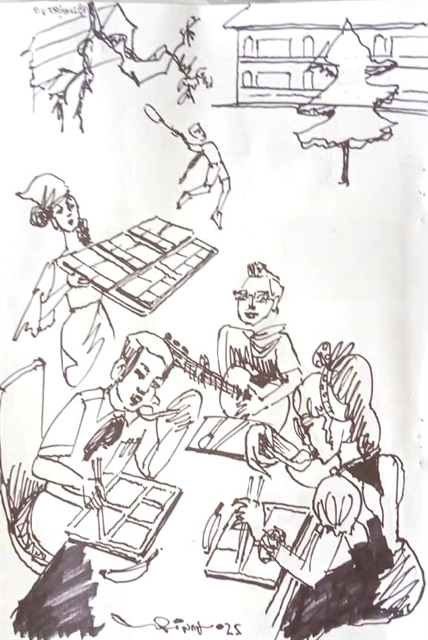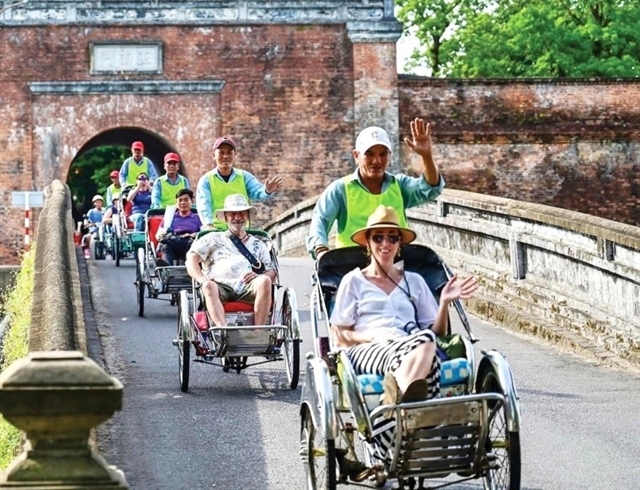 Talk Around Town
Talk Around Town


|
| Illustration by Trịnh Lập |
by Thanh Nga
General Secretary Tô Lâm of the Việt Nam Communist Party has advocated a free-lunch scheme for primary and secondary school students in border communes, particularly in mountainous areas, aimed at enhancing overall wellbeing and supporting academic success.
The policy will begin in land border communes in the 2025-2026 school year, starting in September. Depending on its success, there are plans to gradually expand the programme nationwide.
Local governments that can manage their budgets effectively are encouraged to implement the policy sooner, showcasing their commitment to education and wellbeing.
The implementation will follow a roadmap that ensures alignment with the country’s economic conditions. Maintaining high standards for student meals throughout the programme is crucial, with strict oversight to prevent any reduction in quality.
This programme, alongside the nationwide policy of free-paying class in public grade schools, aims to alleviate the financial burden on families while enriching students’ cultural and artistic education. It fuels hope for a comprehensive educational future where no child goes hungry in class and every student thrives.
“Investing in meals for students in mountainous areas is investing in people. Many developed nations recognise that school meals are vital to education, and Việt Nam is now embracing this enlightened perspective," a teacher in Hà Nội, Nguyễn Ngọc Hoà, said.
Experts say that lunch is a critical factor that keeps students engaged in afternoon classes. In remote areas, many children still bring lunch boxes to school and rely on cold, unsafe food. By providing nutritious lunches, the State is not only offering material support, but also demonstrating a commitment to the health and development of future generations.
For families in mountainous regions, where living conditions are often challenging, the free lunch policy represents an opportunity for transformative change.
Teacher Ma Thị Phượng in Hà Giang Province called it a chance to change the life of these children.
“With a full lunch, they will be healthy, secure in their studies, and less likely to drop out due to poverty,” she said.
The policies of free full-day schooling and lunch support, while differing in scope, share a common goal: to cultivate a fair, humane and modern educational system. They reflect a strong commitment from the highest levels of government, ensuring that every Vietnamese child, whether in urban or rural areas, has the right to a bright future filled with opportunity.
If implemented effectively, these policies could mark a significant leap forward in creating a learning society where all students can thrive in a better nurturing environment.
As Hà Nội prepares to start a free-lunch scheme for students in public primary and secondary schools, it stands ready to support approximately 1.2 to 1.3 million students. With a projected lunch cost of around VNĐ30,000 per student (just over US$1), the financial commitment is substantial. However, given Hà Nội’s impressive budget revenues, the city is poised to lead this essential initiative.
Nguyễn Thế Thắng, principal of Thạch Hòa Primary School in Thạch Thất District, has acknowledged the challenges of providing meals for his students, saying that only 120 out of over 600 students currently have lunch at school due to staffing and facility constraints.
"With government support for free lunches, students' health and academic performance would improve, alleviating parental concerns," Thắng said.
Education expert Bùi Khánh Nguyên said that a nutritious school lunch is not just about health; it’s critical for fostering a conducive learning environment. “For many poor students, lunch at school might be their only nutritious meal of the day,” he said.
Nguyễn Xuân Khang, chairman of the Marie Curie School Board, believes this policy aligns with public aspirations and modern educational trends. If executed well, it could enhance students' wellbeing and shift the educational culture to prioritise student-centred learning.
"While current facilities may not support 100 per cent boarding, the prospect of free lunches could change that. With proper investment in kitchens and staffing, schools could ensure that all students receive nutritious meals, especially during two-session school days," Khang said.
Expert Lê Viết Khuyến from the Việt Nam Association for Promoting Education underscored the importance of a coordinated effort across sectors - education, health, finance and agriculture - to ensure the sustainability of school meal programmes.
"Countries like Thailand and Japan have long recognised the value of such policy, and Việt Nam is now taking steps to adapt these successful models to its unique context," Khuyến said. VNS




